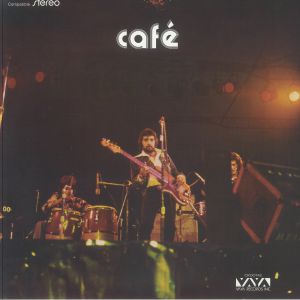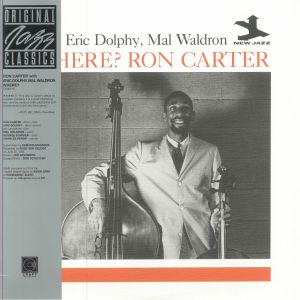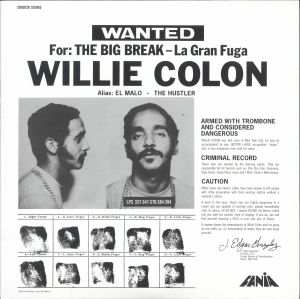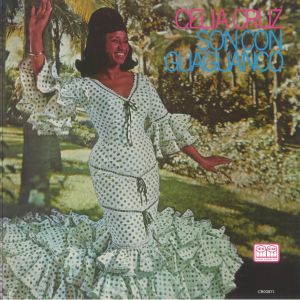Filter
Stock
Type
Music
Format
Label
Featured
Release Title
Price
Tags
Back catalogue: All genres
Juno's full catalogue of All genres
Alben
Review: A deep dive into the Fania vaults has uncovered Cafe, a Latin funk and soul classic that was recorded half a century ago. To mark the 50th anniversary of this great album, which was produced by the legendary conguero Ray Barretto and originally released on Vaya Records, it gets this nice heavyweight reissue on Craft. The standout track 'Si Dame Tu Amor' delivers infectious funk grooves reminiscent of Barretto's own work, while 'Identify Yourself' is another one to light up any party. All the tunes have been cut from the original master tapes by Kevin Gray at Cohearent Audio so sounds superb.
… Read moreGespielt von: Craig Charles Funk And Soul
in stock $36.18
Review: Renowned bassist Ron Carter's inaugural album, 'Where?' introduced a stellar lineup of talent alongside the main man including Eric Dolphy on clarinet, saxophone, and flute, and pianist Mal Waldron. Originally recorded at Rudy Van Gelder Studios in New Jersey in 1961, the record showcases the early brilliance of Carter's musical vision. Now reissued as part of the Original Jazz Classics Series, this edition is pressed on high-quality 180-gram vinyl by RTI. Mastered with meticulous care by Kevin Gray at Cohearent Audio, using analogue techniques from the original tapes, this release offers a pristine listening experience and is a great chance to rediscover the timeless allure of Carter's debut masterpiece.
… Read moreGespielt von: Juno Recommends Jazz
in stock $39.81
La Gran Fuga: The Big Break (reissue) (limited 180 gram vinyl LP + poster)
Cat: 725603 4. Rel: 11 Apr 24
International
Review: Craft Latino's vinyl reissue of Willie Colon and Hector Lavoe's 1970 album La Gran Fuga is a welcome revival of one of Latin music's most iconic collaborations. Newly remastered and pressed on 180-gram vinyl, this release allows listeners to experience the brilliance of Colon and Lavoe's sixth album in all its glory. With classics like 'Barrunto,' 'Pa' Colombia,' and 'Abuelita,' 'La Gran Fuga' presents the duo's unparalleled creativity and commercial success. Backed by a talented lineup of musicians overseen by Johnny Pacheco, Colon and Lavoe push the boundaries of salsa music, incorporating diverse musical traditions and delivering dance-floor hits alongside emotive ballads. The album's iconic cover art, featuring Colon's "Malo" alter-ego in an FBI wanted poster, adds to its cultural significance. Despite initial controversy, La Gran Fuga became a massive success, earning the duo their second Gold certification and solidifying their place in Latin music history. Retrospectively praised as "essential music" and lauded for its confidence and flexibility, La Gran Fuga remains a shining emblem of the Colon/Lavoe musical aesthetic. As listeners revisit these timeless tracks, they're reminded of the duo's remarkable talent and enduring legacy.
… Read moreGespielt von: Juno Recommends International
in stock $37.58
Review: This reissue brings an essential piece of Latin music history back to life. The album crackles with energy, blending Afro-Cuban rhythms with an electrifying brass section and masterful percussion. Upbeat guaracha mambo, driving son montuno and cha-cha-cha grooves create an infectious momentum, while the arrangements from legends like Tito Puente, Charlie Palmieri and Louie Ramirez ensure every track is dynamic and meticulously crafted. The opener is a self-affirming explosion of rhythm, setting the tone for a collection that seamlessly balances joyful exuberance with poignant storytelling. Tracks like the rapid-fire guaracha about the struggles of rebuilding life as an immigrant add depth, while lighthearted guajira melodies and a playful cha-cha-cha about space travel showcase remarkable versatility. Despite its initial modest success, this record was a foundational moment, paving the way for an illustrious career that would define and elevate salsa worldwide. The remastering from the original analogue tapes ensures a rich listening experience. Nearly six decades later, its impact and brilliance remain undeniable.
… Read moreGespielt von: Craig Charles Funk And Soul
in stock $37.30
Review: Celia & Johnny, released in 1974 on Fania Records, marked a pivotal moment for both Celia Cruz and salsa music. By this point, Cruz was already a celebrated star in Cuba, but her attempts to break into the U.S. salsa scene had struggled. Enter Johnny Pacheco, co-founder of Fania Records and leader of the Fania All-Stars. A longtime admirer of Celia's powerful contralto voice, Pacheco believed her potential had been stifled by overly complex arrangements. He was confident that pairing her voice with his more streamlined Afro-Caribbean rhythms would catapult her into salsa stardomiand he was right. The album produced two defining hits, 'Toro Mata' and 'Quimbara', both of which immediately resonated with dancers and salsa enthusiasts. The infectious grooves provided by Pacheco's band allowed Celia's voice to shine, and the success of these tracks solidified her status as the Queen of Salsa. Celia & Johnny is now seen as a cornerstone of salsa's golden age. The record's blend of traditional Cuban styles like mambo, guaracha, and guaguanco with the modern salsa sound brought the genre to a wider audience, particularly younger U.S.-born Latinos. Deep cuts like 'Tengo El Idde', 'Lo Tuyo Es Mental', and 'Canto a La Habana' further showcase Cruz's versatility, with moving performances that tap into spiritual, comedic and patriotic themes. Ultimately, Celia & Johnny remains a landmark collaboration that helped define the global appeal of salsa.
… Read moreGespielt von: Juno Recommends International
in stock $36.73

 USD
USD










